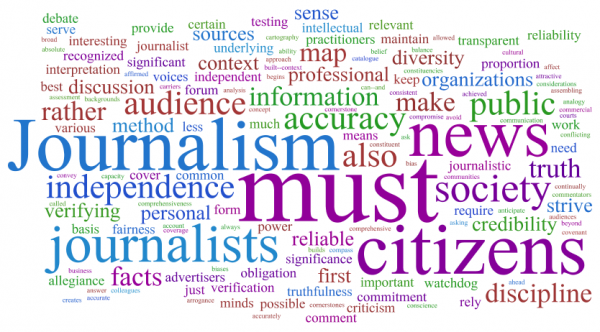BILL KELLER: I find much to admire in America’s history of crusading journalists, from the pamphleteers to the muckrakers to the New Journalism of the ’60s to the best of today’s activist bloggers. At their best, their fortitude and passion have stimulated genuine reforms (often, as in the Progressive Era, thanks to the journalists’ “political relationships with governments”). I hope the coverage you led of the National Security Agency’s hyperactive surveillance will lead to some  overdue accountability. But the kind of journalism The Times and other mainstream news organizations practice — at their best — includes an awful lot to be proud of, too, revelations from Watergate to torture and secret prisons to the malfeasance of the financial industry, and including some pre-Snowden revelations about the N.S.A.’s abuse of its authority. Those are highlights that leap to mind, but you’ll find examples in just about every day’s report. Journalists in this tradition have plenty of opinions, but by setting them aside to follow the facts — as a judge in court is supposed to set aside prejudices to follow the law and the evidence — they can often produce results that are more substantial and more credible. The mainstream press has had its failures — episodes of credulousness, false equivalency, sensationalism and inattention — for which we have been deservedly flogged. I expect you’ll say, not flogged enough. So I pass you the lash. MORE
overdue accountability. But the kind of journalism The Times and other mainstream news organizations practice — at their best — includes an awful lot to be proud of, too, revelations from Watergate to torture and secret prisons to the malfeasance of the financial industry, and including some pre-Snowden revelations about the N.S.A.’s abuse of its authority. Those are highlights that leap to mind, but you’ll find examples in just about every day’s report. Journalists in this tradition have plenty of opinions, but by setting them aside to follow the facts — as a judge in court is supposed to set aside prejudices to follow the law and the evidence — they can often produce results that are more substantial and more credible. The mainstream press has had its failures — episodes of credulousness, false equivalency, sensationalism and inattention — for which we have been deservedly flogged. I expect you’ll say, not flogged enough. So I pass you the lash. MORE
GLENN GREENWALD: There’s no question that journalists at establishment media venues, certainly including The New York Times, have produced some superb reporting over the last couple of decades. I don’t think anyone contends that what has become (rather recently) the standard model for a reporter — concealing one’s subjective perspectives or what appears to be “opinions” — precludes good journalism. But this model has also produced lots of atrocious journalism and some toxic habits that are weakening the profession. A journalist who is petrified of appearing to express any opinions will often steer clear of declarative sentences about what is true, opting instead for a cowardly and unhelpful “here’s-what-both-sides-say-and-I-won’t-resolve-the-conflicts” formulation. That rewards dishonesty on the part of political and corporate officials who know they can rely on “objective” reporters to amplify their falsehoods without challenge (i.e., reporting is reduced to “X says Y” rather than “X says Y and that’s false”). […]It is, I believe, very hard to argue that the ostensibly “objective” tone required by large media outlets builds public trust, given the very low esteem with which the public regards those media institutions. Far more than concerns about ideological bias, the collapse of media credibility stems from things like helping the U.S. government disseminate falsehoods that led to the Iraq War and, more generally, a glaring subservience to political power: pathologies exacerbated by the reportorial ban on any making clear, declarative statements about the words and actions of political officials out of fear that one will be accused of bias. MORE
and corporate officials who know they can rely on “objective” reporters to amplify their falsehoods without challenge (i.e., reporting is reduced to “X says Y” rather than “X says Y and that’s false”). […]It is, I believe, very hard to argue that the ostensibly “objective” tone required by large media outlets builds public trust, given the very low esteem with which the public regards those media institutions. Far more than concerns about ideological bias, the collapse of media credibility stems from things like helping the U.S. government disseminate falsehoods that led to the Iraq War and, more generally, a glaring subservience to political power: pathologies exacerbated by the reportorial ban on any making clear, declarative statements about the words and actions of political officials out of fear that one will be accused of bias. MORE
MARY SCOTT: “Impartial reporting” has become nothing more than “he said-she said” journalism where false equivalencies abound. Talking points are often repeated as if they are facts rather than the poll-tested rhetoric they actually are. Often, they’re designed to misrepresent the real intent of political policy – a good example is the Republican claim they want to “save Medicare and Medicaid for our children” while they actually want to voucherize both, making them unaffordable for many in the next generation. The unwillingness of many journalists to expose such lies is not only bad journalism but it encourages those in the public eye, to tell more lies. NBC News political director and MSNBC host Chuck Todd recently stated that it’s not his job to correct the constant Republican lies about the ACA that he gives airs on his show. If it isn’t his job as a newsman, then what is? Glenn Greenwald makes a sound case for the need for more transparency, more fact-based journalism and more truth telling. I used to rely on the press for accurate information prior to their total fail on Iraq. I would like to be able to do so, again. I will be following his new endeavor. MORE

